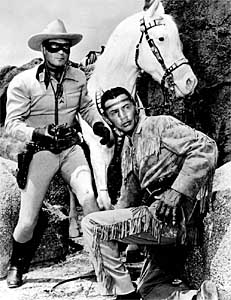Based on what I've read--for instance, the recent comic book--I always thought Tonto found the Lone Ranger and saved him from death. That would put Tonto in a heroic position--doing something for the Ranger that the Ranger couldn't do himself. But that's not the case in Enter the Lone Ranger.
For starters, the Ranger (he isn't named in the episode, but his brother is Captain Reid) appears to be wounded in the shoulder. That kind of injury generally isn't fatal. With his one good arm, he crawls to a nearby cliff that offers shade and a trickle of water.
With water and shade, the Ranger could've survived a week or so without help. His position was far from hopeless. After a little rest, he could've washed and dressed his own wound. He could've fired his gun to attract passersby. When he ran out of ammo, he could've used the other Rangers' guns. Someone presumably knew what the Rangers were doing and would've looked for them eventually. The Rangers' horses might've returned to town and alerted people that something was wrong.
So the Ranger is in a tough position, but he's not about to die. That's problem no. 1.
Enter Tonto
We don't have to worry about the possibilities above because Tonto soon happens by. He spots the wounded Ranger and goes to help him. Here are Tonto's immortal first words:
Ahem. The Ranger, who is still weak, is wearing a ring with two crossed arrows. Tonto recognizes it. The following dialogue ensues:
RANGER: Kemo...sabe? That sounds familiar.
TONTO: That right, kemo sabe. You, trusty scout.
RANGER: Trusty...scout?
TONTO: Yes, Ranger. Long time back, when we both young. Me remember time Indian camp burned.
TONTO: Me never forget you. You remember now?
RANGER: Yes. You...you’re Tonto!
TONTO: That’s right. Me, Tonto! Now, me take care of you.
By nursing the Ranger back to health, he's repaying part of the debt. But the Ranger is still in the superior position. According to some versions of morality, when you save someone's life, the person owes you a lifetime of gratitude. Some would argue that Tonto is obligated to serve the Ranger for the rest of his life.
That's problem no. 2.
Tonto lives to serve
We'll see this problem throughout Enter the Lone Ranger. Tonto doesn't act as if the two men are square: "I saved you, you saved me, let's call it even." Tonto still feels he owes the Ranger for saving him long ago. He'll spend the rest of the episode acting as if he's bound to the Ranger. As if the Ranger is the master and he's the servant.
If the Ranger hadn't crawled to safety, if he hadn't saved Tonto long ago, the relationship would be straightforward. The Ranger lost a battle, Tonto saved him, Tonto is in the superior position. The Ranger owes him for saving his life.
Instead, the creators have manipulated the scenario so the Ranger is superior even though he's injured. Tonto needed the Ranger, but the Ranger didn't need him. Tonto still owes the Ranger and must repay his debt.
If you had any doubt, Enter the Lone Ranger offers a reassuring message: The white man is better than the Indian. In this series, no brown-skinned savage will ever seem superior to a civilized white man.
For more on the subject, see The Lone Ranger.


No comments:
Post a Comment
Note: Only a member of this blog may post a comment.